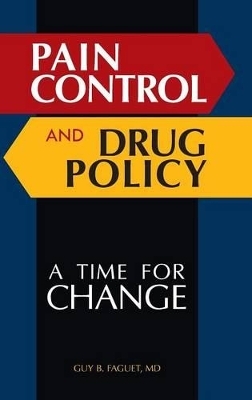
Pain Control and Drug Policy
Praeger Publishers Inc (Verlag)
978-0-313-38280-2 (ISBN)
Pain Control and Drug Policy: A Time for Change focuses on America's national crisis in pain management caused by the widening divergence between the enormous contributions of opioids ("narcotics") to pain management in the clinical setting and the mistaken belief that they are dangerous, highly addictive drugs. After dissecting the strategy and tactics of the War on Drugs from medical, historical, legal, socioeconomic, and geopolitical perspectives, Guy Faguet MD indicts the 40-year-long War on Drugs for having failed to stem the supply of illicit drugs in America despite expenditures of half a trillion dollars, despite violating the basic human right to pain relief of tens of millions of American chronic pain sufferers, and despite fomenting organized crime, government corruption, racial injustice, and social disruption in both the United States and the producer countries. He concludes with a clarion call for the abandonment of the War on Drugs, disbanding the Drug Enforcement Administration, and encouraging Congress to repeal the Controlled Substances Act.
As a clinical and research oncologist responsible for the chronic pain management of thousands of cancer patients over the course of his 30-year career, Dr. Faguet knows that the most effective and safest way to manage most cases of chronic pain is with opioids. All modern pain-management textbooks advocate "titration to effect" in cases where opioids help: that is, gradually increasing the dosage until either the pain is acceptably controlled or the side effects begin to outweigh the pain-relief benefits. Yet the vast majority of doctors don't practice what the medical textbooks teach and instead prescribe opioids very reluctantly and conservatively. As a result, only half of all chronic pain sufferers-and fewer than half of all cancer patients-get adequate pain relief from their doctors. Why do physicians radically undertreat pain that is susceptible to opioid analgesics? They fear that if they prescribe Schedule II opioids in accordance with the professional standards of pain management set by such medical bodies as the American Pain Society, they will be investigated by the DEA, stigmatized, prosecuted as criminals, stripped of their licenses, and sent to jail. Visit Guy B. Faguet, MD's website here: www.faguet.net.
Guy B. Faguet is retired professor of medicine in hematology/oncology at the Medical College of Georgia in Augusta, GA, where he practiced, taught, and conducted research for 30 years.
Preface
I. History and Politics of Mind-Altering Drugs
1 Prohibition: An Historical Precedent
Alcohol Manufacture and Consumption
Health Effects
Crime and Corruption
2 The Lure of Mind-Altering Substances
Poppy and Opium through the Ages
Antiquity
The Ancient Greeks
The Muslims
India and China
Drugs in the 21st Century
Worldwide Drug Consumption
Trends in Global Drug Consumption
Trends in U.S. Drug Consumption
3 The Politics of Drug Legislation
A Convoluted American Political Saga
Global Drug Control: International Conventions
II. Medical Aspects of Mind-Altering Drugs
4 Current Theories of Addiction
The Disease (Victim) Model
The Behavioral (Choice) Model
5 Pain Control: Narcotics and the DEA
The Specter of the DEA
DEA's Infringement on Standard of Care
6 Painkillers
Narcotics (Opioids)
Mechanisms of Action
Efficacy
General Principals of Administration
Side Effects
Nonopioids
Mechanisms of Action
Efficacy
General Principals of Administration
Side Effects
III. Geopolitics: Casualties of the Drug War
7 Colombia
From "La Violencia" to Self-Defense Armies
Guerrilla and Counter-Guerrilla Armies: Origins and Evolution
Fuerzas Armadas Revolucionarias de Colombia (FARC)
Ejército de Liberación Nacional (ELN)
Autodefensas Unidas de Colombia (AUC) or Paramilitares
8 Afghanistan
The Early Days: Prying by the British Empire
Events Leading to the Soviet Invasion
The Soviet-Afghan War (1979–1989)
The Aftermath of the Soviet-Afghan War
The Rise and Fall of the Taliban
National and International Implications
Opium Production and the Taliban
IV. Reforming Drug Policy
9 Reform Proposals
Framing the Discussion
Illustrative Reform Proposals and Positions
The RAND Corporation Proposal
The Senlis Council Proposal
The Cato Institute's Stance
10 A Rational, Evidence-Driven Drug Policy
Conclusions
References
Index
| Erscheint lt. Verlag | 15.4.2010 |
|---|---|
| Zusatzinfo | 16 bw illus |
| Sprache | englisch |
| Maße | 156 x 235 mm |
| Gewicht | 567 g |
| Themenwelt | Medizin / Pharmazie ► Medizinische Fachgebiete ► Psychiatrie / Psychotherapie |
| Medizin / Pharmazie ► Medizinische Fachgebiete ► Schmerztherapie | |
| ISBN-10 | 0-313-38280-8 / 0313382808 |
| ISBN-13 | 978-0-313-38280-2 / 9780313382802 |
| Zustand | Neuware |
| Haben Sie eine Frage zum Produkt? |
aus dem Bereich


